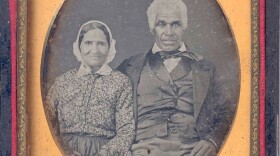
For architects, a groundbreaking ceremony is the beginning of a vision realized. But architect Donald White needed to break new ground in a much different way to get his career started.
In the early 1930s, White became the first African-American to earn a degree from the University of Michigan's School of Architecture. He went on to become the first licensed black architect in the state.
On a clear, cold morning in January, we visited one of the buildings White designed in Detroit. Rightway Baptist Church is in the Core City neighborhood. Karen Burton met me there. She's the co-founder of Noir Design Parti, a group that celebrates the work of African-American architects in Detroit.
"If we look at architecture today, we know that there are fewer than 5% African-American licensed architects," says Burton. "For Donald White, back in the early 1930s, late 1920s ... even fewer. Certainly no one that he could really look up to to say, 'That's who I want to be like.'"
Finding commissions
The church is a brick building in a residential neighborhood that's now dotted with vacant lots between the remaining homes. White designed it in the early 1950s, and it originally became the home to the Aijalon Baptist Church. Burton says chuches were a common project for African-American architects at the time.
"Black architects would have had to find someone to commission their projects, find someone who had the money to build," she says. "Churches certainly had a larger treasury than most people, so churches were the types of projects that black architects could get quite easily."
Burton believes the church was designed for a congregation that lived mainly in the neighborhood. The church is on a corner close to the street. There are crosses inlayed in the brick on either side of the entryway. The original windows have been filled in with cinder blocks and thick glass cubes.
"They probably were not there when Donald White designed this church," Burton says. "It may have been a stained glass window, which would be more traditional."
Burton says some city churches felt they had to replace windows for better security. The outside brickwork has been painted white, another feature that's unlikely to be part of White's original design.
Buildings fall to make way for "urban renewal"
Many of White's buildings have been torn down over the years, a byproduct of so-called urban renewal projects in the 1950s and 60s.
"Paradise Valley area, Black Bottom area – where a lot of prominent African-Americans and a lot of black businesses were – those areas were torn down so that highway construction could be done, new neighborhoods could be built."
Burton says that cycle of tearing down and uprooting black neighborhoods made it difficult for African-American architects to find clients who were developing generational wealth and could afford to commission renovations or new buildings.
Paying it forward
"Donald White was very well known for helping other black architects start their careers," Burton said. "Not only did he do work here in Michigan and then in Alabama, where he was licensed, he also worked with his partner at the time, Frances Griffin for the United States government in Liberia."
And his work influenced another prominent black architect in Detroit: Nathan Johnson. He's possibly best known for designing the People Mover.
Like White, Burton is a graduate of the University of Michigan School of Architecture and she's African-American. She didn't learn about White until years after she graduated, when an alumni magazine published an article about him following his death in 2002. Burton immediately recognaized him as a pioneer and is still doing more research on his life.
"I certainly look up to him now because I can understand the types of things that he probably went through as an architect."
Want to support reporting like this? Consider making a gift to Michigan Radio today.








